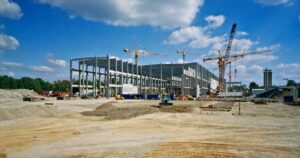 Entering the U.S. real estate market can be an exciting move for foreign developers. The opportunities are enormous, but so are the risks. Regulations vary from state to state, contracts carry significant consequences, and the margin for error is small, especially when millions of dollars are involved.
Entering the U.S. real estate market can be an exciting move for foreign developers. The opportunities are enormous, but so are the risks. Regulations vary from state to state, contracts carry significant consequences, and the margin for error is small, especially when millions of dollars are involved.
At Ayala Law, we work with developers from around the world, navigating Florida’s commercial and residential projects. Foreign investors often come to us with the same concern, “How do I protect my capital before construction begins?”
Below, we break down the key steps every foreign real estate developer should take before breaking ground in the United States. This guide is designed to give you clarity, practical insight, and the confidence to move forward with the right legal framework behind you.
Do Foreign Developers Need a U.S. Entity Before Starting a Project
Many international developers underestimate the importance of forming a proper business entity before acquiring land or entering development agreements. In almost every scenario, forming a U.S. legal entity is essential.
A U.S. entity provides:
Liability Protection: Your home-country corporation does not protect you from U.S. lawsuits. The entity you form here will.
Credibility with Lenders and Local Partners: Banks, contractors, architects, and city officials often prefer dealing with a domestic entity.
Operational Efficiency: Permitting, licensing, and contract execution are significantly easier through a properly structured U.S. company.
For most real estate projects, developers form an LLC or limited partnership. The structure depends on tax strategy, international ownership, financing needs, and the project size. This is not a decision to leave to guesswork. Foreign developers should work with both U.S. corporate counsel and home-country tax advisors to ensure the structure works on both sides.
What Contracts Do Foreign Developers Need Before Breaking Ground
Real estate development in the U.S. is contract-driven. Before construction begins, several agreements must be drafted and negotiated to protect against foreseeable disputes.
Land Purchase Agreement
Your contract should address:
- Title defects
- Due diligence periods
- Environmental conditions
- Zoning verification
- Remedies if sellers fail to comply
Foreign developers often overlook how broad a seller’s representations must be to prevent future issues.
Joint Venture Agreements
If partnering with a local developer, define each party’s:
- Capital contributions
- Decision-making authority
- Exit rights
- Profit distribution
- Dispute resolution terms
Without clear boundaries, joint ventures often end in litigation. Many cross-border partnerships fail because expectations were never contractually aligned at the outset.
Architect and Engineering Agreements
Ensure the contract covers:
- Scope of work
- Liability for design errors
- Timeline requirements
- Termination rights
Design disputes are among the most common and costly issues in development litigation.
Construction Contract (GC Agreement)
Foreign developers should specifically negotiate:
- Payment structures
- Change order procedures
- Delays and liquidated damages
- Insurance and bonding
- Indemnification
Florida construction laws are unique, especially regarding lien rights. A well-drafted contract reduces risk dramatically.
How Zoning and Permitting Affect Foreign Development Projects
Foreign developers often assume zoning approval is a straightforward administrative task. In the U.S., zoning and permitting can significantly alter the scope, timeline, and cost of a project.
Why Zoning Research Must Be Done Before Closing on Land
Zoning determines:
- Density
- Height restrictions
- Parking requirements
- Setbacks
- Mixed-use allowances
- Whether variances are required
Many developers lose time and money after discovering that their intended project is not permissible as planned.
Navigating Local Government Approval
Each city or county has its own process. Some require public hearings, neighborhood meetings, or complex concurrency requirements. With foreign clients, we often step in early to communicate with local agencies, prepare zoning analyses, and identify hurdles before they impact the investment.
What Risks Foreign Developers Face Without Proper Compliance
Foreign developers face unique vulnerabilities in U.S. projects.
Currency Exchange Exposure: Delays can increase costs when currency values shift. Contract terms should account for this risk.
Lien Exposure from Contractors: In Florida, contractors and subcontractors have powerful lien rights. Without strict notices and documentation, developers can face liens even after paying a general contractor.
Construction Delays and Cost Overruns: If not addressed in the contract, developers may have limited recourse against a contractor who causes delay or mismanages resources.
Litigation Risk: Cross-border misunderstandings are a leading cause of disputes. Clarity in contracts and communication prevents many avoidable lawsuits.
Should Foreign Developers Hire Local Counsel Before Securing Property
Yes, local counsel is not just helpful, it’s essential.
- Review feasibility studies
- Guide entity formation
- Oversee due diligence
- Negotiate contracts
- Coordinate with local consultants
- Identify zoning barriers early
- Protect your rights during construction
When international projects turn into litigation, the most common theme is that the developer moved too quickly without counsel familiar with U.S. development laws.
Key Tips for Foreign Developers Investing in U.S. Real Estate
- Form your U.S. entity early.
- Get a written zoning analysis before purchasing land.
- Use detailed contracts with contractors, partners, and consultants.
- Require strict change order procedures.
- Understand lien law and payment processes.
- Document everything.
- Involve local counsel from day one.
These steps significantly reduce disputes and protect your investment long before any concrete is poured.
Final Thoughts
Foreign developers bring vision, capital, and innovation to the U.S. market. But the American real estate system is complex, and mistakes made before breaking ground can have long-lasting and expensive consequences.
At our firm, we represent international developers building in Florida. Whether you are acquiring your first parcel or planning a multi-phase project, we help you structure your investment, negotiate your contracts, and limit your risk at every stage.
If you are a foreign developer preparing to invest in the United States, contact one of our experienced attorneys in Miami at 305-570-2208.
You can also contact our founding attorney Eduardo A. Maura at eduardo@ayalalawpa.com.
Schedule a case evaluation online here.
[The opinions in this blog are not intended to be legal advice. You should consult with an attorney about the particulars of your case].
Subscribe to Our Blog
Stay informed with our latest blog posts delivered directly to your inbox. Gain valuable legal insights, tips, and advice from our seasoned attorneys.







